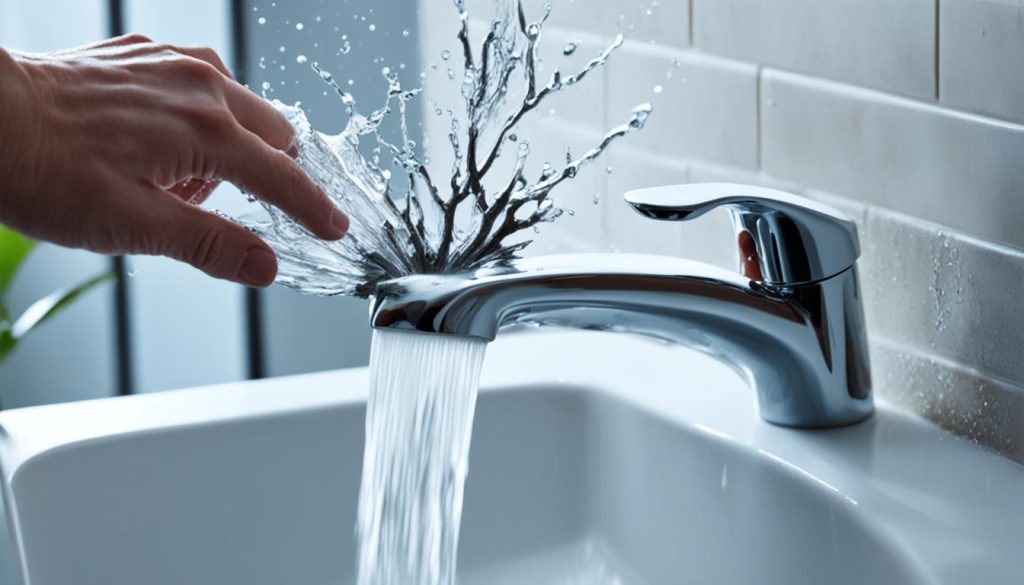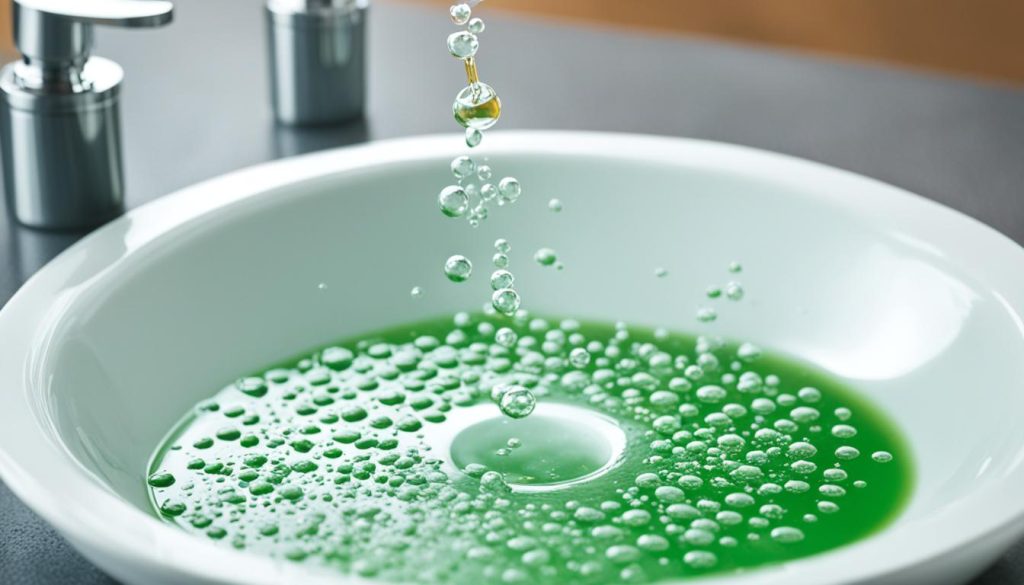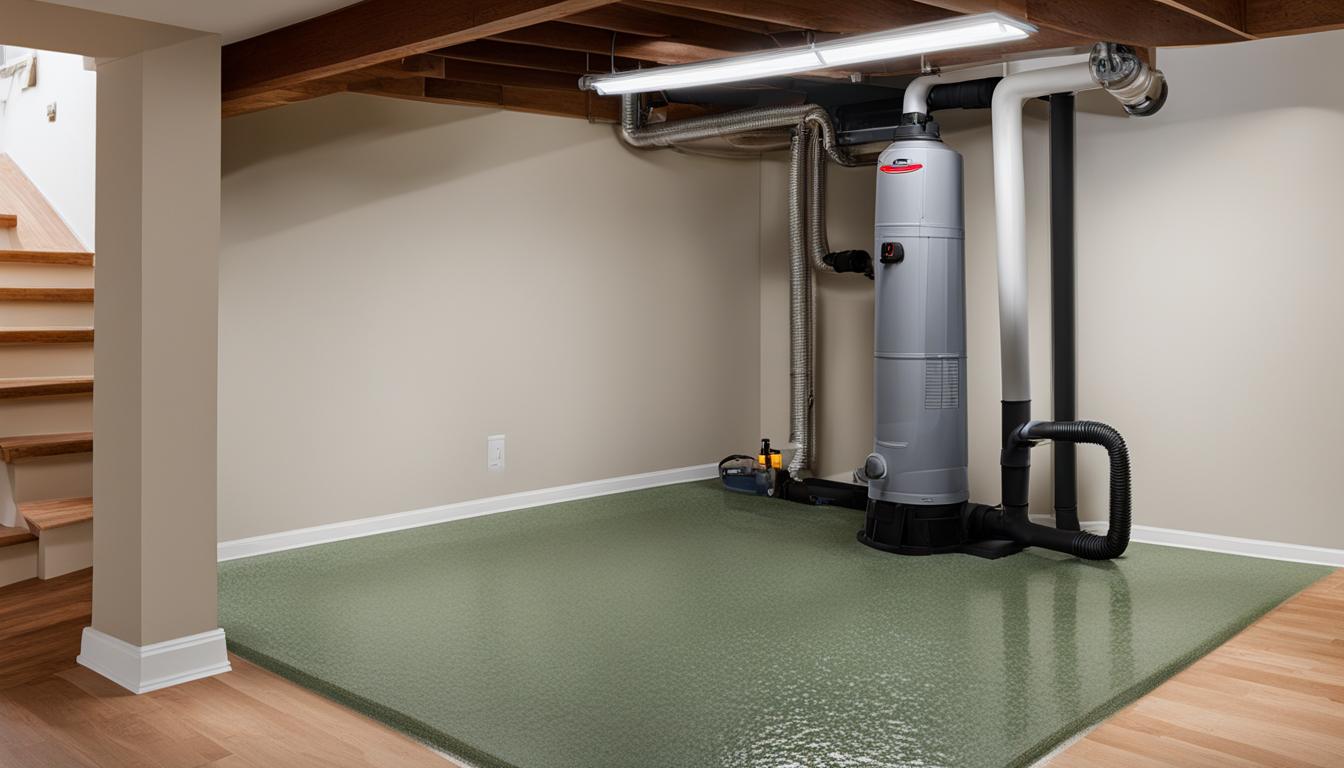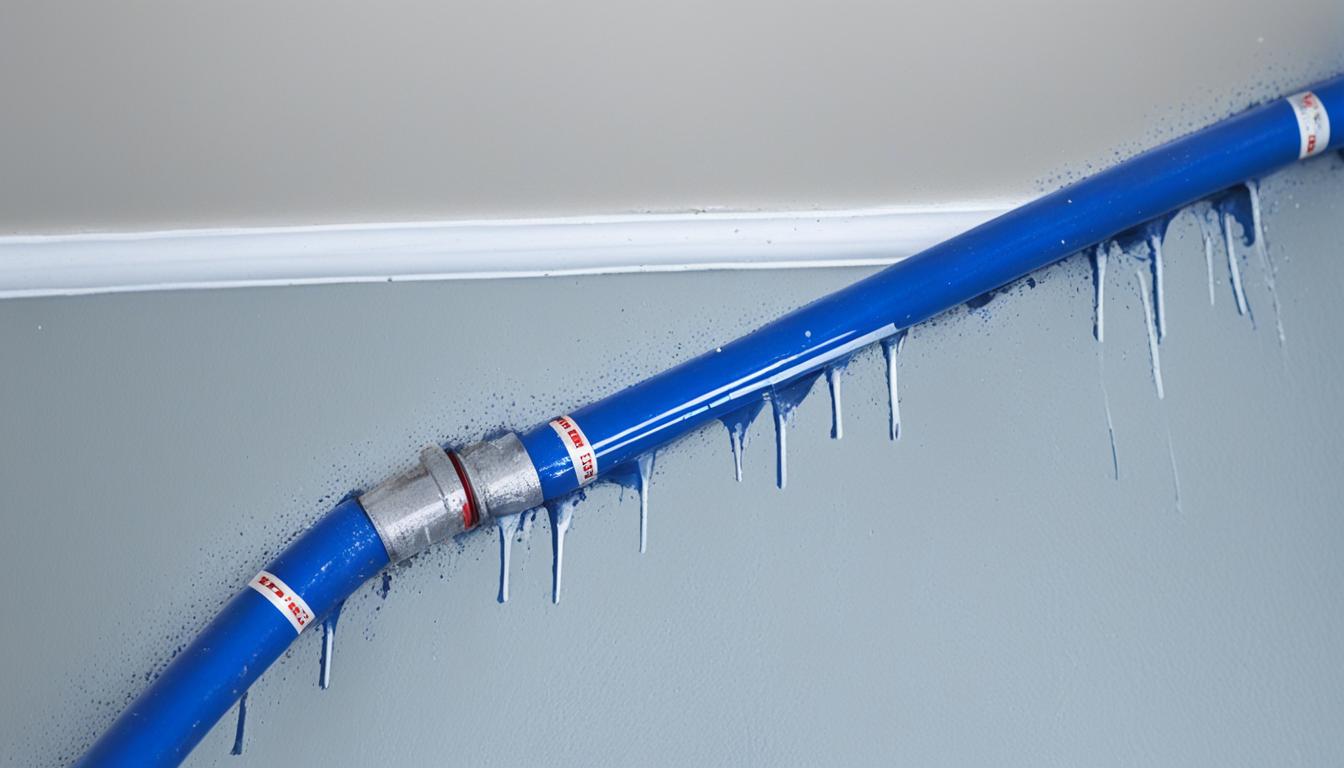Why Pour Salt Down the Drain? Quick Tips & Tricks
Did you know that a single drop of water can travel through a network of pipes that span the length of five football fields? Our drains play a crucial role in maintaining a clean and functional plumbing system. But what if I told you that pouring salt down the drain could actually help in keeping your pipes clear and clog-free?
While salt alone may not be able to clear a clog, when combined with other substances like vinegar and hot water, it can contribute to clearer pipes. Let’s explore the benefits of using salt as a natural drain cleaner and how it can be a cost-effective and eco-friendly solution for maintaining your plumbing.
Key Takeaways:
- Pouring salt down the drain can be an effective method for maintaining clean and clog-free pipes.
- When combined with vinegar and hot water, salt can help break down grease and emulsified fats.
- Salt can absorb odors and prevent build-up in your drains, making it a natural and cost-effective alternative to chemical drain cleaners.
- However, it is important to use salt in moderation and follow proper instructions to avoid potential risks or pipe damage.
- If you’re facing tough clogs or mainline blockages, it is advisable to seek professional drain cleaning services for effective and safe solutions.
What Not to Put Down Your Drain
When it comes to maintaining your plumbing system, there are certain items that should never be poured down the drain. These common household substances can cause clogs and damage to your pipes, leading to costly repairs and inconveniences. It’s essential to understand what not to put down your drain to keep your plumbing running smoothly.
Harmful Substances:
Here are some items that can clog pipes and drains:
- Grease: Pouring grease down the drain may seem convenient, but it rapidly solidifies and can create stubborn clogs in your pipes. Instead, dispose of grease in a sealed container.
- Expanding Food: Rice and pasta can expand when exposed to water, leading to blockages. Avoid flushing these down the drain and dispose of them in the trash.
- Coffee Grounds: While it may be tempting to wash coffee grounds down the sink, they can accumulate and cause blockages. Dispose of coffee grounds in the compost or garbage bin.
- Flour: Flour can clump together and form a thick paste when combined with water, potentially blocking your drains. Dispose of flour in the garbage.
- Eggshells: Despite their small size, eggshells can contribute to clogs due to their sticky membrane lining. Dispose of eggshells in the compost or garbage.
- Fibrous Fruits and Veggies: Stringy or fibrous foods like celery, corn husks, and potato peels can tangle and create blockages in your plumbing. Throw them in the garbage or compost.
- Paint: Avoid pouring paint down the drain as it can contaminate water sources and damage pipes. Dispose of paint properly at a local hazardous waste facility.
- Paper Products: Flushing paper towels, napkins, or wipes down the drain can lead to clogs. Dispose of these items in the trash.
- Harsh Cleaning Products: Chemical cleaning agents can corrode pipes and harm the environment. Use eco-friendly alternatives and dispose of chemicals at designated facilities.
- Flushable Products: Despite the label, so-called “flushable” wipes and hygiene products can still cause clogs. Dispose of them in the trash can.
- Medication: Flushing medication down the drain can contaminate water supplies. Follow proper disposal guidelines provided by local pharmacies or take-back programs.
By avoiding these common items, you can help prevent clogs and maintain a healthy plumbing system.
When a Clogged Sink Becomes a Bigger Problem
A mainline clog is a serious plumbing issue that can cause property damage and contaminate your water supply. When multiple drains in your home start backing up at once, it could be a sign of a mainline clog. Additionally, if you notice sewage being forced up through floor drains or sewer cleanouts, or if water backs up in the shower when you flush the toilet, these are all indications of a main sewer line blockage.
When these signs occur, it is crucial to seek professional assistance immediately. Ignoring or attempting to tackle the problem on your own can lead to further damage and health risks. Professional plumbers have the expertise and equipment to accurately diagnose the issue and effectively clear the mainline clog, restoring proper functioning to your plumbing system.
Don’t let a clogged sink escalate into a larger problem. Contacting a professional for main sewer line blockage is the best course of action to prevent costly repairs and ensure the safety of your home and family.
| Signs of a Mainline Clog |
|---|
| Multiple drains backed up at once |
| Sewage forced up floor drains or sewer cleanouts |
| Water backs up in shower when toilet flushes |
Not All Things Are Detrimental
While it’s important to know what not to put down your drain, there are also substances that can actually benefit your plumbing system. Let’s explore some of the advantageous options for maintaining clean and odor-free drains:
The Benefits of Using Salt in Drains
Salt, when combined with vinegar and hot water, can be a useful tool for clearer pipes. It has the ability to break down grease and emulsified fats, helping to prevent build-up and maintain a healthier drain system. However, it’s important to note that salt alone cannot clear a clog. It works best when combined with other substances, such as vinegar or baking soda.
The Advantages of Vinegar for Drain Cleaning
Using vinegar as a natural cleaning solution can be highly effective in removing blockages and eliminating harmful bacteria that cause foul odors. Vinegar’s acidic properties make it an excellent choice for breaking down stubborn residue, making it a popular DIY option for drain cleaning.
Using Baking Soda and Vinegar to Clean Drains
In combination with boiling water, baking soda and vinegar create a powerful homemade cleaning solution that can help clear drains. The chemical reaction that occurs when these two ingredients are mixed together helps break down debris and remove minor clogs.
Using Boiling Water to Clean Drains
Boiling water is a simple yet effective method to flush out debris and potential clogs from your drains. It helps to melt away grease and dissolve other substances that may be clinging to the pipes. However, caution should be exercised when using boiling water to avoid damaging certain types of plumbing fixtures or pipes.
Using Vinegar to Remove Foul Odors
Vinegar’s acidic properties make it an excellent odor eliminator. By pouring vinegar down your drains, you can effectively neutralize foul odors and freshen up your plumbing system.
Utilizing these substances can help maintain the cleanliness and functionality of your drains. However, it’s important to follow proper instructions and use them in moderation to avoid any adverse effects on your plumbing system.
The Myth of Pouring Salt Down the Drain
The idea that pouring salt down the drain can effectively clear a clog lacks substantial evidence and expert backing. While salt may have some minor benefits when used in homemade mixtures with other substances, pouring large quantities of salt down the drain is not advisable and could lead to further plumbing complications.
Although salt is often touted as a natural drain cleaner, it does have limitations in unclogging drains. Salt alone is not powerful enough to break down tough clogs caused by hair, soap scum, or other debris. It is more effective at preventing clogs and maintaining the cleanliness of your drains rather than clearing existing blockages.
Furthermore, combining boiling water and salt can pose risks to your plumbing system. The sudden temperature change may cause porcelain sinks to crack or PVC pipes to weaken. Additionally, the mixture can create splashback, potentially causing burns or damage to surrounding surfaces.
When it comes to dealing with stubborn clogs, professional drain cleaning methods are a more effective and safer solution. Drain cleaning professionals have the expertise and appropriate tools, such as drain snakes or hydro jetting equipment, to tackle even the most stubborn blockages. They can ensure that your drains are thoroughly cleared without risking further damage to your plumbing system.
So, while salt may have some minor benefits for drain maintenance, it is best to rely on professional drain cleaning services for effective clog removal and long-lasting results.
The Takeaway: Leave Drain Cleaning to the Professionals
When it comes to dealing with plumbing issues and drain cleaning, it’s best to leave it to the professionals. Attempting DIY drain cleaning methods can come with risks that may not effectively resolve the problem and could potentially lead to further damage. To avoid such complications, it is recommended to enlist the expertise and equipment of professional plumbers.
Professional plumbers have the necessary skills, experience, and knowledge to diagnose and fix plumbing issues efficiently and safely. They understand the intricacies of drain systems, enabling them to perform thorough drain cleaning without the risks associated with using boiling water and salt. This ensures that your plumbing system remains intact and functional.
To avoid plumbing complications and costly repairs, it’s important to take proper care of your drains and seek professional assistance as needed. Professional drain cleaning offers various benefits, including the proper removal of stubborn clogs and the prevention of future blockages. Plus, by relying on professionals, you can save yourself time, effort, and potential frustrations.
So, whether you’re dealing with a minor clog or a more complex plumbing issue, reach out to a trusted professional plumber. They have the expertise and equipment to accurately assess the situation, provide effective solutions, and ensure the long-term health of your plumbing system.
- Investing Wisely: How Windows & Doors in Boost Property Value and Financial Health - April 24, 2025
- The Financial Impact of Personal Injuries: Why Legal Help Matters for Business Owners - April 16, 2025
- The Hidden Financial Costs of Domestic Assault: What Business Owners Need to Know - April 16, 2025














